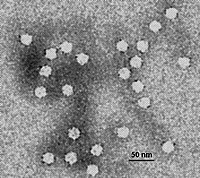
Photo from wikipedia
OBJECTIVES The aim of this study was to determine whether ultrasonographic pancreatic echogenicity, especially hypoechogenicity, has an impact on the prognosis of cats with suspected pancreatitis. We hypothesised that cats… Click to show full abstract
OBJECTIVES The aim of this study was to determine whether ultrasonographic pancreatic echogenicity, especially hypoechogenicity, has an impact on the prognosis of cats with suspected pancreatitis. We hypothesised that cats with a hypoechoic pancreas have a longer duration of hospitalisation, higher treatment costs and a higher mortality rate. METHODS This was a retrospective study, which included cats with clinical signs of pancreatitis, a SNAP fPL test result above the reference interval and ultrasonographic abnormalities consistent with pancreatitis. Medical records and follow-up information were retrieved from the local electronic database. Cases were assigned to one of three groups based on pancreatic echogenicity: hypoechoic, hyperechoic or mixed echogenicity. Statistical analysis aimed to assess differences in outcome, ultrasonographic abnormalities, historical features, physical examination findings, laboratory results, concurrent diseases or treatment costs. RESULTS Thirty-six (64%) cats with a hypoechoic, seven (13%) with a hyperechoic and 13 (23%) cats with a mixed echoic pancreas were included. Cats with a hypoechoic pancreas had a significantly lower median body weight (P = 0.010) and lower median body condition score (P = 0.004) compared with the other cats. Furthermore, they were presented as being lethargic significantly more often (P = 0.014), were more likely to have a homogeneously enlarged pancreas (P <0.001) and were less likely to have concurrent abnormalities or diseases, such as ultrasonographic enteric abnormalities (P = 0.020), triaditis (P = 0.013) and diabetes mellitus (P = 0.041). However, there was no difference in treatment costs (P = 0.961), duration of hospitalisation (P = 0.898), survival of hospitalisation (P = 0.419) or survival time (P = 0.256) between groups. CONCLUSIONS AND RELEVANCE In this study, echogenicity was of no prognostic value in cats with suspected pancreatitis. Cats with a hypoechoic pancreas were not associated with a poorer outcome than cats with a hyperechoic or mixed echoic pancreas.
Journal Title: Journal of feline medicine and surgery
Year Published: 2022
Link to full text (if available)
Share on Social Media: Sign Up to like & get
recommendations!